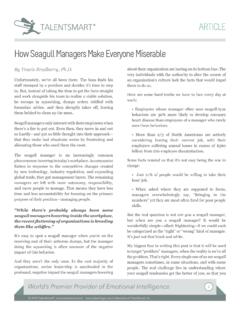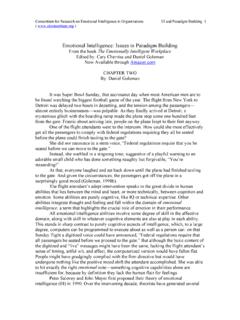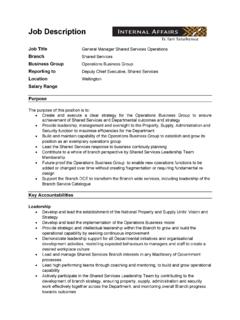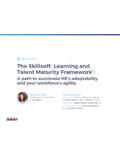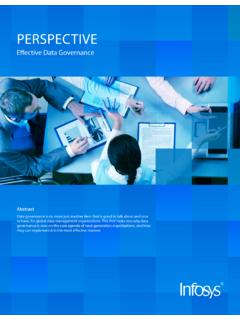Transcription of The Business Case For Emotional Intelligence - …
1 THE Business case FOR Emotional Intelligence (EQ) 2009 UPDATE CONTENTS I. THE MARRIAGE OF EQ AND Business II. Emotional Intelligence case STUDIES III. RECENT ARTICLES ON Emotional Intelligence IV. OVERVIEW OF THE Emotional Intelligence APPRAISAL The Business case For Emotional Intelligence 1996-2009 TalentSmart, Inc. 2 I. THE MARRIAGE OF EQ AND Business The value of Emotional Intelligence (EQ) in perspective: "A leader's Intelligence has to have a strong Emotional component. He has to have high levels of self-awareness, maturity and self-control. She must be able to withstand the heat, handle setbacks and when those lucky moments arise, enjoy success with equal parts of joy and humility. No doubt Emotional Intelligence is more rare than book smarts, but my experience says it is actually more important in the making of a leader. You just can't ignore it." JACK WELCH, CHAIRMAN OF GENERAL ELECTRIC SPEAKING TO THE WALL STREET JOURNAL "Research shows convincingly that EQ is more important than IQ in almost every role and many times more important in leadership roles.
2 This finding is accentuated as we move from the control philosophy of the industrial age to an empowering release philosophy of the knowledge worker age. DR. STEPHEN COVEY, AUTHOR OF THE 7 HABITS OF HIGHLY EFFECTIVE PEOPLE In the fields I have studied, Emotional Intelligence is much more powerful than IQ in determining who emerges as a leader. IQ is a threshold competence. You need it, but it doesn't make you a star. Emotional Intelligence can. WARREN BENNIS, RENOWNED LEADERSHIP PIONEER, AUTHOR AND RESEARCHER EQ is a driving force in the $40 billion training and development industry. The 1998 Harvard Business Review article on Emotional Intelligence is their most popular piece of all time. Subsequent articles in HBR focused on: Emotionally intelligent teams. Emotionally intelligent organizations. Leaders who drive organization performance through EQ. TalentSmart studies show the link between EQ and job performance: EQ alone explains 58% of a leader s job performance.
3 90% of top performers are high in EQ. Just 20% of low performers are high in EQ. EQ is linked to job performance for employees at all levels, in virtually every industry. The Business case For Emotional Intelligence 1996-2009 TalentSmart, Inc. 3 Your Emotional Intelligence is a product of Personal Competence and Social Competence. These qualities divide into four unique skills: Personal Competence is the collective power of your self-awareness and self-management skills. It's how you use Emotional Intelligence in situations that are more about you personally. Self-Awareness. Can I accurately identify my own emotions and tendencies as they happen? Self-Management: Can I manage my emotions and behavior to a positive outcome? Social Competence is the combination of your social awareness and relationship management skills. It's more about how you are with other people. Social Awareness: Can I accurately identify your emotions and tendencies as I interact with you?
4 Relationship Management: Can I manage the interaction I have with others constructively and to a positive outcome? The Business case For Emotional Intelligence 1996-2009 TalentSmart, Inc. 4 II. Emotional Intelligence case STUDIES Building a Powerful Sales Force Hallmark Communities sales staff who developed Emotional Intelligence were 25% more productive than their low EQ counterparts and EQ was more important to executive job performance than character, strategic thinking, and focus on results. TalentSmart s EQ Learning program raised individual and team EQ for the low and high EQ groups to improve group cohesion and job performance (Bradberry, 2003). A Multinational Consulting Firm measured the EQ of senior partners on Emotional Intelligence competencies. Partners high in EQ were responsible for $ million more profit each in their clients than low EQ partners.
5 High EQ partners showed a 139% gain in profit (Boyatzis, 1999). Improving Operational Efficiency AT&T participated in a large, cross-industry study that found in all levels of management (from line supervisors to senior executives) increased Emotional Intelligence , measured through the Emotional Intelligence Appraisal , accounted for 20% more productivity than low EQ leaders. Ninety-one percent of top performers were high in EQ, while only 26% of low performers were high in EQ. Emotional Intelligence explained nearly 60% of job performance across companies in the study (Bradberry, 2002). Coca-Cola saw division leaders who developed EQ competencies outperform their targets by more than 15%. Division leaders who didn t develop their EQ missed targets by the same margin (McClelland, 1999). Selecting Top Talent The US Air Force reduced recruiter turnover from 35% annually to 5% annually by selecting candidates high in Emotional Intelligence .
6 Total cost savings of $3 million per year on a $10,000 investment (GAO Archive). L Oreal realized a $91,370 increase per head for salespeople selected for EQ skills. The group also had 63% less turnover than sales staff not part of the EQ program (Cherniss, 2003). The Business case For Emotional Intelligence 1996-2009 TalentSmart, Inc. 5 EQ is needed in more areas of your organization than you think: The Emotional Intelligence Quick Book (Simon and Schuster, 2005) reviews a study analyzing the Emotional Intelligence scores of hundreds of thousands of individuals who tested their EQ with the Emotional Intelligence Appraisal . EQ scores dropped sharply for individuals holding titles of Director and above. EQ scores for individuals holding positions traditionally considered to be low EQ jobs did not live up to the stereotype.
7 Differences in EQ scores between individuals in sales, finance, and information technology were insignificant. Only engineering positions and the unemployed were definitively lower in EQ. Customer service, HR, Business development and R&D positions were highest in EQ. The Business case For Emotional Intelligence 1996-2009 TalentSmart, Inc. 6 III. RECENT ARTICLES ON Emotional Intelligence By Martha Brant Newsweek June 14 - Psychologists Travis Bradberry and Jean Greaves designed a test that assesses the four pillars of EQ: self-awareness, self-management, social awareness and relationship management. Emotional Intelligence Appraisal was published in 2003, and more than 500,000 people have taken the assessment so far. The pair has used it to teach Fortune 500 companies, governments and even a few royal families how to fix management dysfunction. Now they are making their findings and the test itself available to anyone in their new book, The Emotional Intelligence Quick Book: Everything You Need to Know to Put Your EQ to Work.
8 When they say quick, they mean it. The test only takes about seven minutes, and the book is a fast read with compelling anecdotes and good context in which to understand and improve your score. Bradberry recently spoke with NEWSWEEK s Martha Brant. Excerpts: NEWSWEEK: How much can people really change their EQ? Travis Bradberry: Well, there was an interesting study done at case Western Reserve [University]. They took students through Emotional - Intelligence training not a usual part of training. They tracked students over many years. Even many years after graduating from the program some participants had raised their scores 40 percent. They had trained their brains. Practice doesn t make perfect but practice makes things habitual. Unlike IQ, which is a fixed number, EQ is malleable. So why put a number on it at all? People want it. The only way to get people to do anything is by showing them exactly where they are especially if they are going to work on their EQ.
9 That brings up a very interesting fact in your book: CEOs as a group have very low EQ scores. So are people more successful if they don t play well with others? Within each profession, the best performers have the highest EQs. Even the best CEOs have the highest EQs. But CEOs are often promoted for being good financial managers, not good people managers. Do you think that will change? The demand right now for Emotional Intelligence in Business is huge. They will just get better executives by making high EQ more of the norm. The Business case For Emotional Intelligence 1996-2009 TalentSmart, Inc. 7 The Business case For Emotional Intelligence 1996-2009 TalentSmart, Inc. 8 The Business case For Emotional Intelligence 1996-2009 TalentSmart, Inc. 9 Summary of cover article, Natural Born Sellers sales and marketing management magazine Both.
10 In the cover article of the July issue of Sales and Marketing Manager Magazine, Julia Chang tackles a thought provoking quandary. What is the relationship between Emotional Intelligence and sales force effectiveness? Most sales executives are uncertain. Less than half of the Sales and Marketing Manager readers surveyed had implemented an Emotional Intelligence skills development program in their organization. The Perfect Salesperson Myth It seems that the perfect salesperson comes in many forms. Greg Strakosch sums it up nicely when he says, "There's not one right or wrong way; you either get the results or you don't. The five most successful salespeople I know all have different styles." A common held misconception was that a salesperson had to be aggressive and inappropriately persuasive to meet or beat his or her targets. Sales executives who implement Emotional Intelligence programs quickly become converts, when they see the bottom line impact of this skill.







